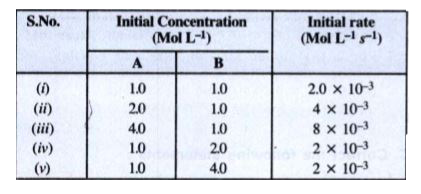If we know the equilibrium constant for a particular reaction, we can calculate the concentrations in the equilibrium mixture from the initial ocncentrations. Commonly only the initial concentration of reactants are given.
In above prolem, what is Kp at the temperature of the experiment.
1
2
3
None of these
The correct Answer is:C
Topper's Solved these Questions
- CHEMICAL EQUILIBRIUMBOOK - MOTIONCHAPTER - CHEMICAL EQUILIBRIUMEXERCISE - Exercise - 3
67 Videos
- CHEMICAL EQUILIBRIUMBOOK - MOTIONCHAPTER - CHEMICAL EQUILIBRIUMEXERCISE - Exercise - 4
20 Videos
- CHEMICAL EQUILIBRIUMBOOK - MOTIONCHAPTER - CHEMICAL EQUILIBRIUMEXERCISE - Exercise - 1
45 Videos
- CHEMICAL BONDING BOOK - MOTIONCHAPTER - CHEMICAL BONDING EXERCISE - EXERCISE -4 LEVEL-II
40 Videos
- Chemical KineticsBOOK - MOTIONCHAPTER - Chemical KineticsEXERCISE - Exercise - 4 (Level - II) (SUBJECTIVE PROBLEM)
1 Videos
Similar Questions
Consider the reaction, A+B→C+D.
The initial rate for different initial concentrations of the reactants are given below :

Calculate the rate constant.
View SolutionConsider the reaction, A+B→C+D.
The initial rate for different initial concentrations of the reactants are given below :

Calculate the rate constant.
View Solution
Knowledge Check
If we know the equilibrium constant for a particular reaction, we can calculate the concentration in the equilibrium mixture from the initial concentrations. Generally only the initial concentration of reactions are given. In above problem, what is Kp of the reaction?
A1B2C4DNone of theseIf we know the equilibrium constant for a particular reaction, we can calculate the concentrations in the equilibrium mixture from the initial ocncentrations. Commonly only the initial concentration of reactants are given.
In a study of equilibrium
2SO2(g)+O2(g)⇔2SO3(g)
Starting with 2 mole SO2 and 1.5 mole O2 in 5 litre flask. Equilibrium mixture required 0.4 mole KMnO4 in acidic medium. Hence Kc is :A0.2B5C675DNone of theseIf we know the equilibrium constant for a particular reaction, we can calculate the concentrations in the equilibrium mixture from the initial ocncentrations. Commonly only the initial concentration of reactants are given.
In a study of equilibrium
H2g+I2(g)⇔2HI(g)
1 mole of H2 and 3 mole of I2 gave rise at equilibrium to x mol of HI.
Addition of a further 2 mol of H2 gave an additional x mol of HI. What is x ?A0.5B1C1.5DNone of these
Consider the reaction, A+B→C+D.
The initial rate for different initial concentrations of the reactants are given below :

Calculate the rate constant.
View SolutionIf we know the equilibrium constant for a particular reaction, we can calculate the concentration in the equilibrium mixture from the initial concentrations. Generally only the initial concentration of reactions are given. In a study of equilibrium
H2(g)+I2(g)⇔2HI(g)
1 mole of H2 and 3 mol of I2 gave rise at equilibrium to x mol of HI, Further addition of 2 mol of H2 gave an additional x mol of HI. What is x ?
View SolutionIf the half-time for a particular reaction is found to be constant and independent of the initial concentration of the reactants, then the reaction is of
View SolutionAssertion : The equilibrium constant for the reverse reaction is equal to the inverse of the equilibrium constant for the forward reaction .
Reason : The value of equilibrium constant is independent of initial concentrations of the reactants and products.
View SolutionAssertion : The equilibrium constant for the reverse reaction is equal to the inverse of the equilibrium constant for the forward reaction .
Reason : The value of equilibrium constant is independent of initial concentrations of the reactants and products.
View Solution
